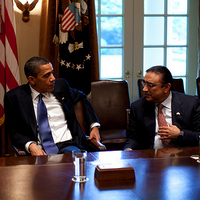The discovery of Osama bin Laden in Abbottabad, Pakistan, has raised uncomfortable questions about both Islamabad's relationship with terrorism and Washington's relationship with Islamabad. Even as the U.S. edges toward its goal of "disrupting, dismantling and defeating al-Qaida in Pakistan and Afghanistan," a cocktail of other groups in Pakistan -- Harakat-ul-Jihad ul-Islami (HuJI), Jaish-e-Muhammad (JeM) and Lashkar-e-Taiba (LeT) key among them -- are ready to step into any void left by al-Qaida, often with official support.
In fact, Islamabad has an economic incentive to keep them alive: As long as such groups are active, the U.S. will provide Pakistan with aid and weapons to help the Pakistani military destroy them. But if these groups are gone, many in Islamabad fear that the U.S. will abandon Pakistan.
But the main reason Islamabad has nurtured militants is Pakistan's insecurity about India. Islamabad's fear of annihilation is driven by Pakistan's smaller population, size, economy and military; the fact that Pakistan is the lower riparian of the Indus River; the fact that New Delhi is increasingly currying favor in Washington; and Pakistan's own identity crisis over the role of Islam. Since 1947, this combination of factors has driven Pakistan to use subnational Islamist militants as a cost-effective way to target India.

